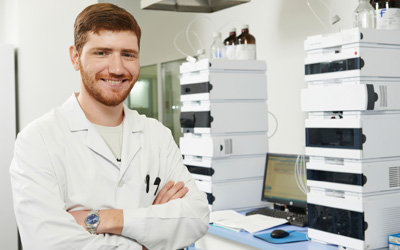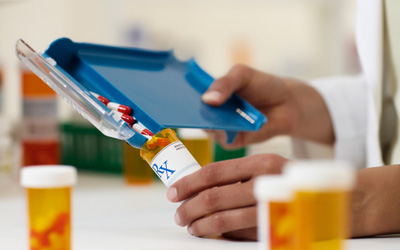The pharmacy technician career has evolved over time. During the 1950s, the American Society of Hospital Pharmacists (ASHP) highlighted the need for pharmacy technicians to assist pharmacists. In 1968, many hospitals initiated training programs for pharmacy technicians, giving them a unique professional status in the fast-growing healthcare industry.

Why should you become a pharmacy technician?
Did you know that the pharmacy technician career has been ranked among the best healthcare jobs by the US News & World Report? Getting a pharmacy technician degree will qualify you to work alongside licensed pharmacists. According to the US Bureau of Labor Statistics (BLS), over 70,000 new job openings are expected in this field from 2012-2022. Becoming a pharmacy technician can be beneficial in more ways than one.
Here are some of the benefits of this profession:
-
Employment growth rate is 20% - faster than average (BLS)
-
Clean working conditions
-
Minimal education and training requirements
-
Potential to grow
What do you need to become a pharmacy technician?
The educational and training requirements for this career vary from state to state. In some states, a high school diploma would suffice, while in others, individuals must acquire formal training and complete a pharmacy technician diploma or program. You can check with your state’s board of pharmacy to find out the requirements. There are a number of schools and colleges offering pharmacy technician programs.

Pharmacy technician associate degree
This is an undergraduate degree program that prepares students for the career by teaching them pharmacy technician theory, laboratory skills, and practical experience.
The degree can be completed in two years. The initial semesters are dedicated to theory development and knowledge building. Students will cover a range of introductory courses that will help them understand the basics of the field. Further in the program, emphasis is laid on practical learning and hands-on experience. Students will learn how to apply techniques for mixing and dispensing medication in a laboratory setting.
Here are some of the courses you may find in the program:
This course will equip students with the understanding of the laws that govern pharmacy. Students will study different state and federal laws that regulate the profession of pharmacy technicians.
This course is designed to teach students about calculations and mathematical procedures used in the practice.
Students enrolled in this course will review the principles of drug action and pharmacokinetics. Students will learn which drugs are used in the treatment of disorders and how they affect the human body.
-
Pharmacy records management
In this course, students will learn how to interpret prescriptions and manage inventory of drugs. Topics such as the following are covered in the course: filing prescription records and third party reimbursement, etc.
Pharmacy technician certificate program
This is a short program that is designed to provide students with practical experience and career oriented knowledge. The program can take six to twelve months to complete, depending on which school you enroll in.
The coursework is divided into theoretical learning and laboratory experiences. Students will not only develop a sound understanding of pharmacy concepts, but also practically learn how to prepare prescriptions, assist pharmacists, and perform different administrative tasks.
Here are some of the courses covered in the program:
-
Dosage forms and routes of administration
In this course, students will learn how to dispense medication to patients. Topics such as the following are covered: basic measurement system, mathematical techniques, and methods of administering medications into the body.
-
Dispensing medications and the community pharmacy
This course is designed to equip students with knowledge of dispensing medication. Here are some of the topics covered in this course: mechanics of billing, inventory management, purchasing and receiving, and management in pharmacy settings.
-
Names, indications, abbreviations, and prescription reading
This course will prepare students to classify and identify different drugs. Students will learn about various drugs administered in hospitals, common pharmacy abbreviations, acronyms, and pronunciations.
-
Chemotherapy and miscellaneous pharmaceutical products
In this course, students will learn about different chemotherapeutic drugs, biologic drugs, vitamins, antidotes, and herbs.
Externship
In many pharmacy technician programs, students are required to complete an externship under the supervision of a licensed pharmacist. Externship programs are geared towards providing students with hands on experience and practical knowledge.
Learning outcomes
By the end of a pharmacy technician program, students would be able to:
-
Demonstrate knowledge of drugs and prescriptions
-
Successfully dispense medication according to provided prescriptions
-
Identify and classify different drug names, brand names, and generic names
-
Use appropriate techniques for accurate processing of drug prescriptions
-
Use mathematical calculations to prepare dosages and add ingredient amounts
-
Understand how to prepare medication using aseptic techniques
-
Manage inventory and assist pharmacists
-
Work within the ethical and legal boundaries of the healthcare profession
How do I enroll in a pharmacy technician program?
The admission requirements are likely to vary from place to place. You will need to have a high school diploma to qualify for any post-secondary course. Here are the general admission requirements:
-
Provide evidence of high school completion or GED equivalency
-
Completion of high school courses such as mathematics, English, and basic sciences
-
Fill out and submit an admission form
-
Submit letters of recommendation
Get certified
In many states, pharmacy technicians are required to be certified by a recognized credentialing organization. The Pharmacy Technician Certification Board (PTCB) is one of the leading organizations that certify pharmacy technicians in the United States. To earn a PTCB certification, applicants must have:
-
Completed high school
-
Clean criminal record
-
Passing scores in the PTCB certification exam

Career prospects
As a pharmacy technician, you can work in pharmacies, hospitals, clinics, and general merchandise stores. Your main duties will include:
-
Filling prescriptions
-
Processing insurance claims
-
Measuring amounts of medications
-
Packaging and labeling prescriptions
-
Managing inventory
-
Assisting pharmacists
According to the BLS, pharmacy technicians made a median annual income of $29,320 in 2012. Factors such as location, certification, and skills may affect your income potential.